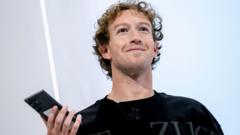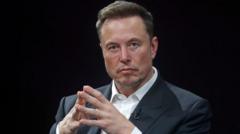As tensions ease between the two influential figures, a significant shift could affect the landscape of American innovation and politics.
Zuckerberg and Trump: A New Chapter of Collaboration?

Zuckerberg and Trump: A New Chapter of Collaboration?
Mark Zuckerberg's recent dinner with Donald Trump at Mar-a-Lago hints at a possible reconciliation between the tech CEO and the president-elect.
In a surprising turn of events, Meta CEO Mark Zuckerberg recently dined with Donald Trump at his resort in Mar-a-Lago, signifying a thaw in their previously strained relationship. The meeting comes amidst burgeoning camaraderie between Trump and other tech leaders, particularly Elon Musk of X fame. Historically, the rapport between Zuckerberg and Trump has been anything but warm; Trump was banned from Facebook and Instagram following the Capitol riots, and he threatened Zuckerberg with prison if he interfered with the upcoming 2024 presidential election.
However, signs suggest the former adversaries are mending fences. A Meta spokesperson acknowledged Zuckerberg's gratitude for the dinner invitation and expressed that it was crucial for the future of American innovation. It seems that after previously firebrand rhetoric, including Trump’s remarks delivered in a book that hinted Zuckerberg could face imprisonment, the tone has softened considerably. In a recent podcast, Trump commented positively on Zuckerberg "staying out of the election" and expressed gratitude for a personal phone call made by the Meta CEO following a serious assassination attempt against him.
Zuckerberg's past missteps, such as censoring claims regarding Hunter Biden's allegations, may have contributed to the contentious dynamics. Furthermore, his previously hefty $400 million donation towards electoral infrastructure raised eyebrows and was perceived by some as an attempt to bypass donation laws. As a result, Zuckerberg stated he would refrain from further monetary contributions aimed at elections, stressing his intention to maintain neutrality.
Details of the discussions during the dinner remain under wraps, but they likely centered around the increasing regulations facing Meta—especially the 2020 antitrust case led by the Federal Trade Commission (FTC). Despite this, Zuckerberg's warming ties with Trump are overshadowed by the former president's deepening relationship with Musk, which has drawn over $100 million in campaign contributions from the billionaire and his allies. Musk has gained considerable influence, so much so that he has even been tasked with overseeing a new governmental initiative, the Department of Government Efficiency, which raises questions about the regulation of his corporate ventures.
While Zuckerberg and Musk share a fraught history, exemplified by a failed project resulting in the destruction of a Facebook satellite aboard a SpaceX rocket in 2016, their rivalry warrants attention, especially against the backdrop of Musk’s growing power in the political arena. Although the two have engaged in lighthearted banter featuring the idea of a physical duel, the likelihood of such a bout occurring remains exceedingly low. As Zuckerberg and Trump navigate their newfound relationship, the implications for the tech industry and U.S. politics may be profound.
However, signs suggest the former adversaries are mending fences. A Meta spokesperson acknowledged Zuckerberg's gratitude for the dinner invitation and expressed that it was crucial for the future of American innovation. It seems that after previously firebrand rhetoric, including Trump’s remarks delivered in a book that hinted Zuckerberg could face imprisonment, the tone has softened considerably. In a recent podcast, Trump commented positively on Zuckerberg "staying out of the election" and expressed gratitude for a personal phone call made by the Meta CEO following a serious assassination attempt against him.
Zuckerberg's past missteps, such as censoring claims regarding Hunter Biden's allegations, may have contributed to the contentious dynamics. Furthermore, his previously hefty $400 million donation towards electoral infrastructure raised eyebrows and was perceived by some as an attempt to bypass donation laws. As a result, Zuckerberg stated he would refrain from further monetary contributions aimed at elections, stressing his intention to maintain neutrality.
Details of the discussions during the dinner remain under wraps, but they likely centered around the increasing regulations facing Meta—especially the 2020 antitrust case led by the Federal Trade Commission (FTC). Despite this, Zuckerberg's warming ties with Trump are overshadowed by the former president's deepening relationship with Musk, which has drawn over $100 million in campaign contributions from the billionaire and his allies. Musk has gained considerable influence, so much so that he has even been tasked with overseeing a new governmental initiative, the Department of Government Efficiency, which raises questions about the regulation of his corporate ventures.
While Zuckerberg and Musk share a fraught history, exemplified by a failed project resulting in the destruction of a Facebook satellite aboard a SpaceX rocket in 2016, their rivalry warrants attention, especially against the backdrop of Musk’s growing power in the political arena. Although the two have engaged in lighthearted banter featuring the idea of a physical duel, the likelihood of such a bout occurring remains exceedingly low. As Zuckerberg and Trump navigate their newfound relationship, the implications for the tech industry and U.S. politics may be profound.





















